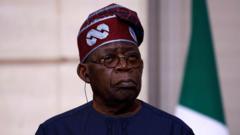In Nigerian politics, an implicit understanding has long guided presidential appointments: the need for ethnic and religious balance to promote national cohesion among its myriad ethnic groups. However, this balance is now perceived to be under threat as President Bola Tinubu faces growing discontent over his choices, with accusations of preferential treatment towards individuals from his Yoruba ethnic group.
Despite claims from the presidency that fairness is maintained, many voices argue that Tinubu’s appointments—particularly within the crucial roles that control the nation’s finances and security—are alarmingly skewed towards one ethnicity. Currently, all eight of the most sensitive governmental positions are filled by individuals from the Yoruba group. The recent appointment of former Shell boss Bayo Ojulari to the Nigerian National Petroleum Company (NNPC) has sparked further debate, serving to exacerbate fears of an ethnic monopoly in governance.
Historically, Nigeria has witnessed factional struggles rooted in its ethnic diversity, which includes over 250 groups, with Hausa-Fulanis, Igbo, and Yoruba being the three largest. Critics point out that Tinubu’s choice of a northern Muslim as his running mate was a deviation from the historical practice of ensuring a mixed Muslim-Christian ticket—reflecting the nation’s roughly equal religious demographic. The appointments under Tinubu starkly differ from those of his predecessors, where a more balanced team was often achieved, even if flaws existed.
Scholars and political analysts express concern that prolonged ethnic favoritism may undermine the nation’s democratic framework and social fabric. As Tinubu’s appointments lean heavily towards just one group, the implications stretch beyond simple governance, potentially threatening national unity and contributing to disenfranchisement among other regions. This alarm has been echoed by northerners who feel marginalized, particularly given that recent removals of key positions have replaced northerners with those from the south.
The administration claims to be striving for a more comprehensive representation; however, skepticism lingers as issues of inclusion dominate the discourse. Internal party dissent is also visible, with northern politicians voicing their discontent over perceived imbalances, underlining a growing rift in what was once a predominantly united party.
While some political analysts urge a shift away from ethnic considerations, the reality remains that ethnic affiliation continues to shape perceptions of leadership and governance in Nigeria. Moving forward, some believe that it will take successive and inclusive leaderships to establish a sense of belonging among all ethnicities for the issue of representation to become less contentious in the nation’s political arena.
Despite claims from the presidency that fairness is maintained, many voices argue that Tinubu’s appointments—particularly within the crucial roles that control the nation’s finances and security—are alarmingly skewed towards one ethnicity. Currently, all eight of the most sensitive governmental positions are filled by individuals from the Yoruba group. The recent appointment of former Shell boss Bayo Ojulari to the Nigerian National Petroleum Company (NNPC) has sparked further debate, serving to exacerbate fears of an ethnic monopoly in governance.
Historically, Nigeria has witnessed factional struggles rooted in its ethnic diversity, which includes over 250 groups, with Hausa-Fulanis, Igbo, and Yoruba being the three largest. Critics point out that Tinubu’s choice of a northern Muslim as his running mate was a deviation from the historical practice of ensuring a mixed Muslim-Christian ticket—reflecting the nation’s roughly equal religious demographic. The appointments under Tinubu starkly differ from those of his predecessors, where a more balanced team was often achieved, even if flaws existed.
Scholars and political analysts express concern that prolonged ethnic favoritism may undermine the nation’s democratic framework and social fabric. As Tinubu’s appointments lean heavily towards just one group, the implications stretch beyond simple governance, potentially threatening national unity and contributing to disenfranchisement among other regions. This alarm has been echoed by northerners who feel marginalized, particularly given that recent removals of key positions have replaced northerners with those from the south.
The administration claims to be striving for a more comprehensive representation; however, skepticism lingers as issues of inclusion dominate the discourse. Internal party dissent is also visible, with northern politicians voicing their discontent over perceived imbalances, underlining a growing rift in what was once a predominantly united party.
While some political analysts urge a shift away from ethnic considerations, the reality remains that ethnic affiliation continues to shape perceptions of leadership and governance in Nigeria. Moving forward, some believe that it will take successive and inclusive leaderships to establish a sense of belonging among all ethnicities for the issue of representation to become less contentious in the nation’s political arena.



















